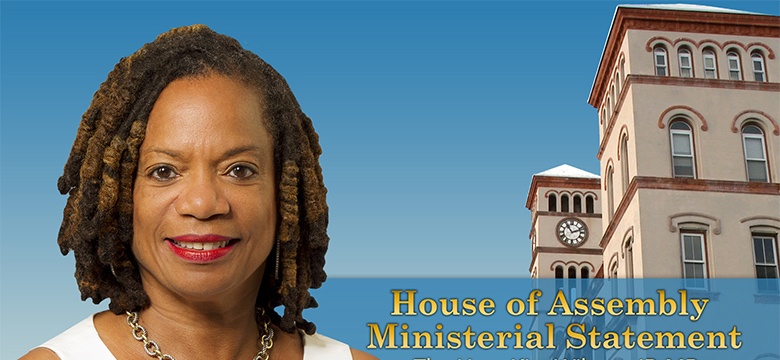
Ministerial Statement by the Minister of Health, the Hon. Kim Wilson, JP MP
Mr Speaker and Honourable Members, I stand before this Honourable House today to table the Bill entitled the Nursing Amendment Act 2018.
Mr Speaker, the regulation of healthcare professionals is essential to meet the Ministry of Health’s mandate to protect and promote public health and ensure high quality care. The Nursing Act 1997 (“the 1997 Act”) is the legislation that assures standards of practice for nurses through registration, monitoring, complaint-handling and disciplinary procedures.
The Nursing Amendment Act 2018 (“the 2018 Bill”) proposes to improve the regulation of midwives by incorporating midwives under the existing regulatory framework for nurses, and transferring the regulatory authority for midwives from the Bermuda Medical Council to the Bermuda Nursing and Midwifery Council.
The 2018 Bill tabled today is the incorporation of midwives under the 1997 Act and the repeal of the Midwives Act 1949.
The Ministry is committed to improving health professionals’ regulation as a means to addressing efficiency in regulation and public safety. Honourable members should be aware that the Midwives Act 1949 contained an outdated regulatory framework for midwives resulting in a limited scope of practice and regulatory oversight. The Ministry considered proposing amendments to the outdated Midwives Act, however, maintaining separate legislation for one profession with a small number of practitioners is not practical.
Mr Speaker, the Ministry remains in ongoing consultation with registered midwives and other stakeholders for a phased approach to enhance safety and quality of care for women and babies as well as address choice and potential cost savings for the health system.
The first phase involves a transfer of regulatory oversight from the Bermuda Medical Council to the Bermuda Nursing and Midwifery Council (“the Council”), improving the criteria for registration and re-registration and creating a code of conduct.
Both Councils support the incorporation of midwives into the 1997 Act, which will align Bermuda with many other countries in the Caribbean, the UK and Ireland.
The second phase will require continued engagement with multiple stakeholders to address some of the limitations impacting midwifery practice in Bermuda, such as, prescribing rights specific to midwifery and the formalisation of collaborative practice amongst stakeholders and policies that ensure safe care of women and babies.
Mr Speaker, the updates to the 1997 Act will include midwives in the majority of the provisions established for nurses. These updates include:
- defining the midwifery profession and protecting the use of the title ‘midwife’;
- including a midwife on the Council, and making the necessary changes to the title of the 1997 Act, the Council and its Committees;
- ensuring a midwifery registration process that includes registration criteria and re-registration every two (2) years that is linked to continuing education and minimum required practice;
- prescribing a code of conduct that includes a scope and standards of practice for midwifery;
- including midwives within the complaint-handling and disciplinary process; and
- improving the Council’s procedures, as required.
Mr Speaker, many of these provisions are familiar to currently registered midwives because all of the midwives registered under the Midwives Act 1949 are also nurses and dually registered under the 1997 Act.
However, it is important to acknowledge that midwifery is a separate profession from nursing and the updates to the 1997 Act will include the regulation of midwives who are not nurses. The Rules to accompany the Act will define a midwife as a person who has:
- completed a midwifery education programme recognized by the Nursing Council; and
- is registered as a midwife in their country of training as approved by the Nursing Council.
Jurisdictions approved by the Nursing Council include but are not limited to Jamaica, other Caribbean countries, Canada, the United States, the UK, and Australia.
The 2018 Bill aims to standardise practices for midwives across healthcare professions, therefore improving Bermuda’s regulatory system. In addition, the changes ensure midwives are subject to a more robust regulatory framework.
Overall, Mr Speaker, the Nursing Amendment Act 2018 ensures a higher regulatory standard for midwives that aims to protect the public by ensuring competent and safe providers of care for women and babies.
Thank you Mr Speaker.
